History of Dogma (7 vols.)
Digital Logos Edition
Overview
Among the foremost proponents of Ritschlian liberalism, Adolf von Harnack has been one of the most influential biblical scholars in the modern age. His writings, noted for their in-depth historical research, assist his readers in the study of biblical interpretation and dogmatics through the lens of history. This set contains his seven noted volumes on the history of dogma. Whether you agree or disagree with Harnack's analysis, this set is a fantastic resource for scholars, teachers, pastors, students, and anybody seeking a firmer grasp on historical theology and biblical studies.
A historian, theologian, and renowned professor in Germany’s most prestigious learning institutions, Harnack lectured at the University level for over fifty years, influencing thousands of students, such as Karl Barth, throughout his lifetime and beyond.
The perfect addition to your Logos collection, these volumes in digital format can be instantaneously searched, providing hundreds of results at the click of a mouse. Scripture references appear on mouseover, and in the Logos edition, you can easily pull biblical studies and dogmatics resources up alongside your favorite Bible for ease of study.
You can get all these volumes and more at great savings with the Adolf von Harnack Collection (22 vols.).

Key Features
- One of the most ambitious treatments of historical theology from one of the most important figures in modern biblical scholarship
- Extensive historical background on the church and dogmatic theology
- Thorough discussion of the foundations and methodology of historical investigation
- Treatment of major theological systems
Praise for Adolf von Harnack
Adolf Harnack (von Harnack from 1914) was the most important representative of theological historicism in Germany. He was the outstanding church historian of his day and one of the most influential academic administrators in the Wilhelmine empire.
—The Dictionary of Historical Theology.
In the range of his achievements Harnack was probably the most outstanding patristic scholar of his generation. He made himself complete master of the early Christian literature, especially of the pre-Nicene period . . .
—The Oxford Dictionary of the Christian Church.
Through his meticulous and wide-ranging scholarship Harnack rescued theology from neglect due to the attacks of Nietzsche and Overbeck.
Product Details
- Title: History of Dogma (7 vols.)
- Author: Adolph von Harnack
- Volumes: 7
- Pages: 2,387
This title is included in the following collections
You can save when you purchase this product as part of a collection.
Adolf von Harnack Collection (...
$99.99$99.992025 Lutheran Portfolio
$4,749.99$4,037.49Logos 7 Portfolio Legacy Libra...
$4,749.99$4,749.99Logos 7 Lutheran Portfolio Leg...
$4,749.99$4,749.99
- $4,749.99
- $11,399.99
- $11,399.99
- $23,999.99$20,399.99
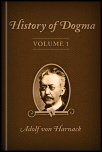
Arguably, there is nobody better than historian Adolph von Harnack to discuss the history of dogma. He meticulously works his way through the definition, limits, divisions, and formation of dogma, covering its history from the early Church to the time of Nitzsch, Loofs, and Renan in this first volume. Dissecting the place of the Gospel of Christ in the history of the Church, this volume ends with an appendix entitled “The Christianity of the Jewish Christians,” which provides a backdrop to the history of Christian Judaism.
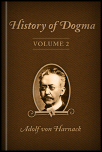
The 358 pages contained in this volume are brimming with studies of the growth, change, and evolution of the early Church’s doctrine. Beginning with the second century and Gnosticism, the book outlines different veins of thought that arose, ending with Origen. Harnack’s observations on Christianity as it relates to early philosophy and science are included.
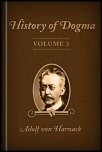
History of Dogma, vol. 3 is divided into two parts. Part one, entitled “Second Book Continued,” discusses the doctrine of Logos, defined by Harnack as “the doctrine of the pre-existence of Christ as a distinct person.” He then delves into modalistic monarchians, the doctrine of Sabellius, the Alexandrian training school, and many well-known theologians from the fourth century.
Part two of History of Dogma, vol. 3 is labeled “The Development of Ecclesiastical Dogma.” He saw the development of dogma in the early church as being heavily Hellenized by Greek metaphysics. Harnack states “the first main division of the history of dogma closed with the adoption of the Logos doctrine as the central dogma of the Church, and with the accompanying revision in the East of the old formulas of the faith under the influence of philosophical theology.” He examines this ecclesiastical paradigm shift in a comprehensive manner, sketching the history of dogma until the eighth century.
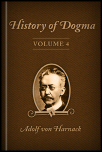
This volume focuses on the Christological controversies of the early Church which culminated in the carefully worked out doctrinal expression in the Definition of Chalcedon in 451 AD. One of the most important early Christological controversies was between the Arian homoiousian doctrine (the Son and the Father are of a similar but not identical substance) and the orthodox homoousian doctrine (the Son and the Father are of the same substance). The First Council of Nicaea, called in 325 AD, was, in part, a reaction to this homoiousian doctrine and aimed to reaffirm the orthodox position. History of Dogma, vol. 4 explores these and other theological developments and historic events such as the Councils of Constantinople, Apollinarianism, the hypostatic union, the controversial filioque, and much more. In addition to Christological issues, this volume also explores the development of saint worship, including Mariolatry.
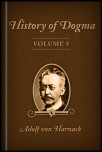
Augustine, a philosopher and theologian during the turn of the fourth century, was a highly influential figure in the dogma of the Church, up until the period of the Carlovingian Renaissance. This volume covers the history of dogma during mediaeval times and contains a general index at the end. The sacraments, the Kingdom of God, and catholicity are a few of the many topics addressed.
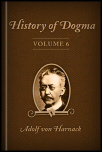
Monastic training of clergy, Scholasticism, and Mysticism are all discussed in History of Dogma, vol. 6. The volume continues until the time of Wycliffe and Thomas Aquinas, also delving into the topics of confirmation, confession, marriage, and priesthood.
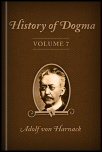
Detailing the history of dogma from the eleventh to the sixteenth century, this volume concludes Harnack’s seven-volume set. Curialism and its opposition are discussed, as is dogma in Roman Catholicism, Antitrinitarinanism, Socinianism, and Protestantism with a focus on Luther’s theology.
About Adolph von Harnack
Adolph von Harnack, born in 1851 in Estonia, lived a life devoted to the study of church history and theology. He became a professor at the age of twenty-four, and taught at the Universities of Leipzig, Giussen, Marbarg, and Berlin until his retirement at age seventy. Although he was widely considered to be one of the most influential members of the Protestant church at the turn of the twentieth century, the Church of Germany believed his theology to be off-base and did not allow him to become an accredited clergyman. Harnack’s passion for the history of the Church led him to pen numerous resources on the matter, his most famous work perhaps being What Is Christianity? He continued his studies and writing until his death in 1930.
Reviews
2 ratings

Charles Puskas
4/19/2015

RICHARD A. RAY
10/23/2013